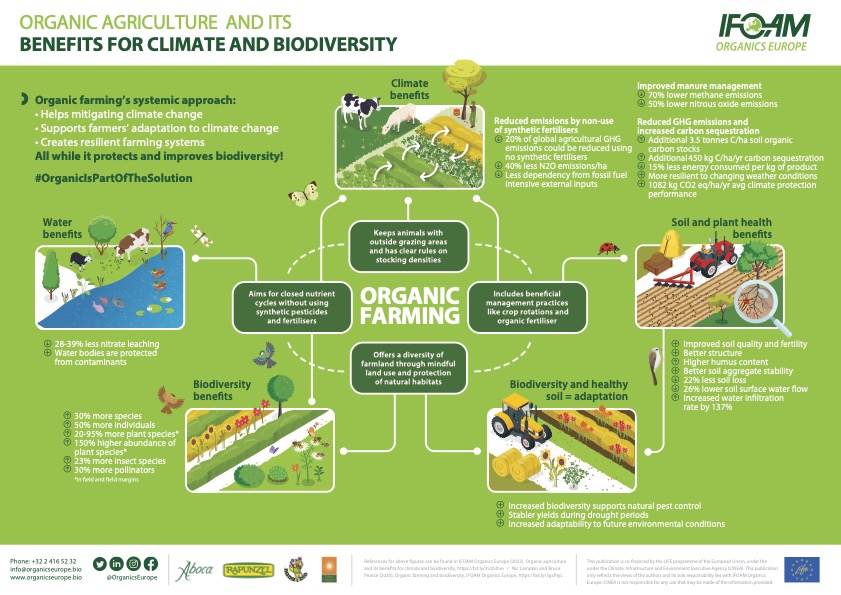Nature restoration law adopting gives hope for food & farming systems
BRUSSELS, 12 JULY 2023 – IFOAM Organics Europe welcomes the adoption of the Nature Restoration Law by MEPs today.
Jan Plagge, IFOAM Organics Europe’ President, said: “This positive vote on nature restoration gives hope that Europeans can collectively make agriculture better for nature. Organic farming is the proof that we can produce enough food while preserving biodiversity, soil and water, and there is no reason to polarize nature protection versus agriculture.”
He added: “MEPs who voted against nature restoration are not defending farmers, they are preparing a harder future and are making our food systems more vulnerable. The sterilisation of our European countryside is happening now, with toxic pesticides and habitats destruction leading to massive losses of birds’ and insects’ populations. Our survival and food security depend on healthy ecosystems. Farmers, nature, and our future should not be taken hostage by politicians playing at culture wars.”
The organic food and farming movement had sent a letter to MEPs ahead of the vote, calling them to vote in favour of nature restoration.
Ends.
Contact details
Eric Gall, Policy Manager, +32 491 07 25 37, [email protected]
Eva Berckmans, Communications Manager, +32 2 416 27 62, [email protected]
or visit www.organicseurope.bio
Background information
About this topic
Organic farming delivers multiple benefits for the climate and biodiversity, including increased carbon sequestration in soils, lower energy input, 30% more on-farm biodiversity and increased resilience of the farming system. These are highlighted in a document on the benefits of organic farming published by IFOAM Organics Europe.
Transforming how we produce food can make a big difference in mitigating climate change, help farmers to adapt and to become more resilient, and to contribute to biodiversity protection. Organic farming offers a systemic approach for reducing greenhouse gas emissions (GHG) and increasing soil carbon sequestration while sustaining healthy soils and protecting biodiversity.

Organic consumes less energy and reduces greenhouse gas (GHG) emissions
- Instead of being dependent on external fossil-fuel intensive fertilizer or pesticide inputs, organic farming relies on establishing closed nutrient cycles and minimizing nitrogen losses. This can reduce global agricultural GHG emissions by around 20%;
- Refraining from synthetic fertilizer use reduces nitrous oxide emissions from soil by 40% per hectare in organic systems;
- Animals in organic systems have access to free range areas, allowed to graze as much as possible and 60% of the feed has to come from the farm or the same region. The reduced number of animals and grassland-based systems reduce emissions and improve carbon stocks in soil;
- Organic agriculture often uses improved manure management such as manure composting which can reduce nitrous oxide and methane emissions from manure by 50% and 70% respectively;
- Organic agriculture has a higher energy efficiency and a lower energy use per hectare. It consumes around 15% less energy per unit produced compared to conventional agriculture.
Organic sequesters and stores more carbon
Many common practices in organic farming, such as crop rotations including legumes or reduced tillage, help to improve soil quality and fertility and contribute significantly to increased carbon sequestration of additional 450 kg C/ha per year compared to land under conventional management.
Organic protects species and habitat diversity
By prohibiting synthetic fertilizers and pesticides and using biodiversity-enhancing practices, such as diverse crop rotations with legumes, landscape elements or reduced tillage, lead to on average 30% more species and 50% more individuals in organically managed areas.
Organic supports ecosystem functions
Organic farming promotes soil health and reduces soil erosion by 22%. It protects water bodies by reducing nitrate leaching by 28-39%. Organic also has a positive impact on crop pollination and it increases natural pest control.
Organic increases the resilience of farming systems
The improved soil structure in organic farming reduces erosion, supports plant health and makes organic more resilient to changing weather conditions. Organic farming does not rely on synthetic fertilizers and pesticides, which makes the organic system less dependent to external inputs. The enhanced biodiversity in organic systems favours stable yields during drought periods and adaptation to future environmental conditions
Useful links
- Organic agriculture and its benefits for climate and biodiversity
- Organic farming and biodiversity
- Plant health care in organic farming
- What we do on biodiversity, soil & water and climate change
IFOAM Organics Europe is the European umbrella organisation for organic food and farming. With almost 200 members in 34 European countries, our work spans the entire organic food chain and beyond: from farmers and processors organisations, retailers, certifiers, consultants, traders, and researchers to environmental and consumer advocacy bodies.

